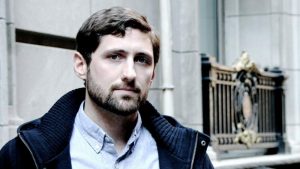BALTIMORE (CNS) — As a young man growing up in New York, Phil Klay knew he was likely to land a career in public service.
Klay’s father had volunteered in the Peace Corps. His mother worked for years in international medical aid, and his maternal grandfather had been a career diplomat.
Following the 9/11 terrorist attacks, however, the young intellectual and future New York Times best-selling author — like many of his generation — was drawn in a different direction.
“We were in Afghanistan already,” Klay remembered. “We were heading into Iraq, and it seemed like the best way to serve my country was to become a Marine.”
When Tom Sleigh, one of Klay’s professors at Dartmouth College and a prominent American poet, discovered his student’s military ambitions, he insisted that Klay read Leo Tolstoy’s “War and Peace,” Louis-Ferdinand Celine’s “Journey into the End of the Night” and a dozen other books that wrestle with war themes.

“He thought that if I was going to be going to war, I should learn about war from some of the greatest minds and think about it,” said Klay, who ultimately joined the Marine Corps and served in Iraq’s Anbar Province as a public affairs officer from January 2007 to February 2008.
Inspired by his experiences in military service and fascinated by the complex moral questions brought on by war and by those dropped in the midst of war, Klay’s writing today centers on questions of right and wrong, sin and salvation. He is especially interested in the isolation often experienced by soldiers when they return to civilian life.
Klay’s Catholic faith is subtly — and sometimes overtly — woven throughout his writings, which include “Redeployment,” a New York Times best-selling short story collection that won the National Book Award for Fiction in 2014.
A graduate of Jesuit-run Regis High School in New York, the 36-year-old author said he was “tremendously” influenced by Jesuits. It was at Regis where he first read Flannery O’Connor, Graham Greene, Evelyn Waugh, G.K. Chesterton, Francois Mauriac, Walker Percy and Shusaku Endo.
“My teachers also modeled a particular type of moral and intellectual engagement with the world,” said Klay, who was part of an after-school club where students read Catholic literature and volunteered at a hospice run by the Sisters of Charity.
“I think a Catholic worldview inflects how I think about sin, about fallibility, about ritual and community and suffering, about being a physical body in the world, but also about being more than mere matter,” he said. “The Jesuit worldview also focuses on the particularities of each situation, a style very appropriate to the fiction writer uninterested in allowing the vitality of his characters to be swallowed up in one ideological system or another.”
Klay, who described himself as the “weirdo” in officer training school who memorized poetry to deal with the boredom of field exercises, said writing has always been his method of making sense of the world — of “taking everything that was messy and confusing and putting it into a form that would sort of test it and force me to grapple with underlying assumptions.”
Klay noted that Catholics who try to be serious about their faith are not allowed to despair. All human beings are made in the image of God and are thus redeemable, he said.
“I don’t think you’re allowed to write human beings off,” said Klay, a parishioner of a Catholic church in the New York City borough of Queens. “These sorts of things affect how you approach characters and how you think about them and the struggles that they’re going through.”
Klay, whose March keynote address on the “Wounds of War” at Loyola University Maryland’s humanities symposium was canceled because of the coronavirus pandemic, said he has completed his next book, “Missionaries.” Set in Colombia, Iraq, Afghanistan and the United States, the novel explores how the American way of war spreads across the globe. He spent six years writing it.
“It’s about the ideologies that we sort of construct around ourselves to justify what we’re doing,” said Klay, a writing professor at Fairfield University, who earned a master’s degree in creative writing from Hunter College of the City University of New York. “In the modern world, everything is connected — everything migrates. The things that we do in Iraq or Afghanistan or Colombia don’t just stay there.”
“Missionaries” is set to debut in October.






















